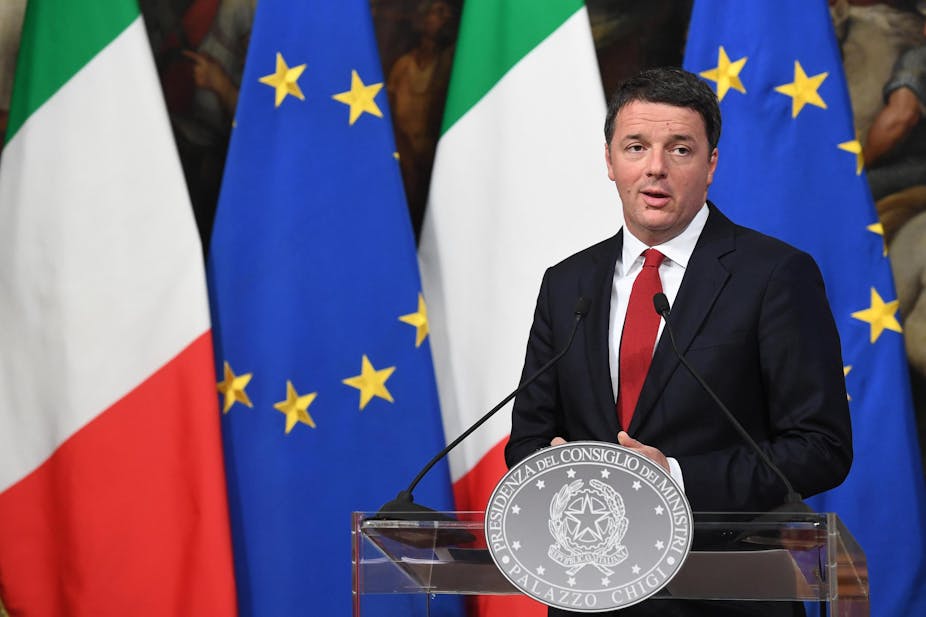On December 4, Italians will cast their vote in a historic referendum. The exact details of the question they are voting on are quite technical – whether or not to accept constitutional reforms promoted by the centre-left prime minister, Matteo Renzi. But the outcome could have significant political and economic consequences – not just for Italy, but for financial markets and the future of the euro.
Renzi has staked his legitimacy on the vote and declared he will resign if the people vote against his reforms. In the context of Italy’s weak economy and the rise of Eurosceptic parties, the political uncertainty sparked by Renzi’s resignation could destabilise the financial and political stability of Italy and the EU.
What are the reforms?
A key element of the proposal intends to alter Italy’s decision-making processes. Currently, both houses of the Italian parliament have the same legislative functions and powers.
Should the constitutional reforms be approved, only the Chamber of Deputies (the lower house) would be fully involved in passing laws. The Senate (the upper house) would became a body representing local authorities, while retaining some legislative power in key areas such as constitutional reform and the ratification of EU treaties.
A second important change would give the state more power and remove that of local authorities. Supporters and critics debate issues of governability, potential for excessive authority in the executive, and the reduced democratic accountability of the new Senate.
Why are markets so worried?
Polls suggest a strong lead in favour of “No”. Investors are worried that potential uncertainty following Renzi’s defeat could damage the integrity of the euro area, bringing back not-so-distant dark memories of the 2011 sovereign debt crisis.
Crucially, investors have become increasingly worried about Italy’s weak banking sector, which is swamped by non-performing loans. These are loans that have not made scheduled payments for at least 90 days and are difficult, if not impossible, to collect.

In January 2016, Renzi reached an agreement with the European Commission on how to address Italy’s €360 billion bad loans problem. The deal involves a guarantee scheme backed by the Italian state and the use of private investors to purchase those non-performing loans.
If Renzi’s government collapses, it would call into question this guarantee scheme, deterring investors from recapitalising troubled banks. And should the recapitalisation and bad debt restructuring of the especially afflicted Monte dei Paschi di Siena bank fail, it could lead to a broader loss of market confidence in Italy’s banking system. This could trigger a series of bank failures.
Referendum fails: Italy leaves the euro?
If Renzi steps down, the decision to call a snap election or appoint a caretaker technocratic government rests with the President of the Republic, Sergio Mattarella. There is little political appetite for yet another government that does not reflect electoral preference. Since Silvio Berlusconi resigned in 2011, Italy has experienced three “unelected” governments.
And so demands for fresh elections are on the rise. Renzi’s defeat would provide political leverage to the populist, anti-establishment and eurosceptic Five Star Movement, which has become one of Italy’s most popular parties since it was founded in 2009.
The Five Star Movement recently launched a campaign to hold a referendum on the euro. There could not be an immediate break from the single currency, however, as Italian law does not allow referendums to repeal international treaties. Further, as demonstrated by the Brexit vote, the legal hurdles implied in a divorce from EU treaties would make the process of leaving the single currency a lengthy and complex exercise.
Referendum passes: business as usual?
If the reforms pass, Renzi would maintain political control until Italy’s next general election in 2018. This would provide a modicum of short-term political and financial stability. In 2018, however, polls indicate a close race between Renzi’s Democratic Party and the Five Star Movement.
To regain political terrain, Renzi would need to win the constitutional referendum by a landslide – an unlikely scenario according to polls. And should the Five Star Movement win in 2018, it would compromise the coalition built by the Democratic Party with other EU member states to move Europe away from austerity.
Regardless of the election’s result, Italians are growing increasingly wary of the single currency. Despite recent surveys purporting strong support for retaining the euro, a study conducted by the European Commission in 2015 reveals Italians have the lowest confidence in the single currency within the euro area.

The referendum’s outcome will almost certainly impact the economic and political balance of Europe. Market turbulence following a No vote would be the result of a full-blown banking crisis – not the departure of Italy from the euro, which is unlikely in the short-term. Even if the eurosceptic Five Star Movement were to win a snap election, it would take some time for them to be able to leave the single currency.
That being said, rising eurosceptic sentiment among Italians should not be underestimated, even in the case of a Yes vote. Given the close race between the Democratic Party and the Five Star Movement, winning the referendum with only a slim majority would not be sufficient for Renzi to secure election in 2018. Rising euroscepticism will provide the Five Star Movement with a chance to win the next general election. Whatever the outcome, Italy’s fading Europeanism will need to be acknowledged and dealt with.

